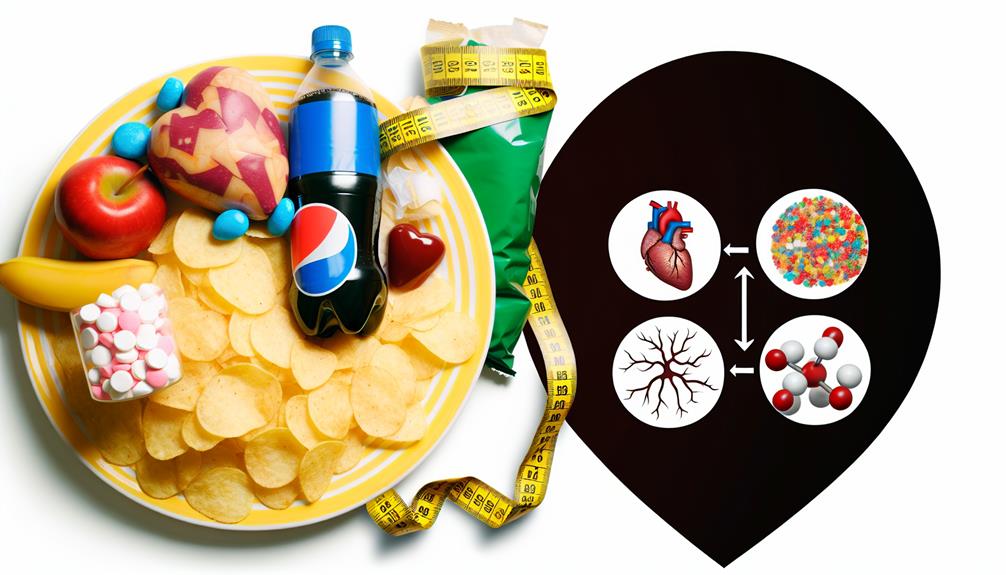Have you ever wondered about the real impact of processed foods on your health? You might have heard conflicting opinions on the topic, but the truth is, there's a growing body of evidence that suggests processed foods can have significant effects on your well-being. From the way they influence your weight to their potential impact on chronic diseases, the discussion around processed foods is crucial for understanding how they fit into a healthy lifestyle. But what exactly are these effects, and how can you navigate the world of processed foods to make the best choices for your health and well-being?
The Rise of Processed Foods
The rise of processed foods has significantly transformed modern dietary patterns, impacting the way you consume and perceive food. Processed foods, including ultra-processed foods, have become more prevalent due to factors such as convenience, longer shelf life, and aggressive marketing strategies promoting their consumption. These foods undergo various levels of processing, from minimal processing for preservation to the addition of ingredients, making them more appealing to consumers with busy lifestyles. As a result, there has been a shift towards increased reliance on processed foods and a decrease in the consumption of whole foods.
The consumption of processed foods has been linked to several health issues, including weight gain, obesity, high blood pressure, and other chronic conditions. This is largely due to the high levels of added sugars, unhealthy fats, and artificial ingredients present in many processed foods. These factors can contribute to an imbalance in your diet, leading to negative health outcomes. It is essential to be mindful of the ingredients in the processed foods you consume and prioritize whole foods in your diet to mitigate these risks.
In today's fast-paced world, it may seem challenging to avoid processed foods altogether. However, making small changes such as reading food labels carefully, cooking more meals at home using fresh ingredients, and reducing the intake of ready-to-eat and pre-made meals can significantly impact your overall health. By being aware of the impact of processed foods on your health and making informed choices, you can take steps towards a healthier and more balanced diet.
Understanding Processed Food
As you explore the impact of processed foods on health, understanding the various levels of food processing and their implications becomes crucial. When it comes to processed foods, it's essential to distinguish between the different levels of processing and their potential effects on health. Here's what you need to know:
- Processed Foods: This category includes foods that have undergone changes from their original state, such as washing, cutting, cooking, canning, or freezing. These foods may still retain much of their nutritional value depending on the processing methods employed.
- Ultra-processed Foods often contain high levels of added sugars, unhealthy fats, and artificial additives. These products can have detrimental effects on your health, including an increased risk of obesity, type 2 diabetes, and heart disease.
- Blood Type: Some research suggests that processed foods may negatively impact different blood types in various ways. Understanding how processed foods affect your blood type can be an essential factor in making dietary choices.
- Intake: The consumption of processed foods can lead to a higher intake of unhealthy ingredients such as salt, sugars, and artificial flavors. Being mindful of your intake of processed foods is crucial for maintaining a balanced diet.
- Whole Foods: Choosing whole, minimally processed foods like frozen vegetables or unsweetened applesauce over ultra-processed options can significantly improve your overall health and well-being.
Understanding the impact of processed foods and making informed choices about the types of processed foods you eat can play a significant role in maintaining a healthy lifestyle.
Health Impacts of Processed Foods

When it comes to the health impacts of processed foods, it's important to consider the nutrient depletion, increased sugar content, and associated health risks. Ultra-processed foods often lack essential nutrients and are loaded with added sugars, leading to spikes in blood glucose levels and various health issues. High consumption of these foods has been linked to obesity, type 2 diabetes, cardiovascular disease, and other chronic conditions.
Nutrient Depletion
Choosing whole, minimally processed foods over heavily processed options can help mitigate the risk of nutrient depletion and support your overall health and well-being. When it comes to nutrient depletion from processed foods, consider the following:
- Processed foods are often stripped of essential vitamins, minerals, and antioxidants during processing.
- A diet high in processed foods may result in deficiencies in nutrients such as fiber, vitamin C, vitamin D, and potassium, impacting overall health.
- Nutrient depletion from processed foods can contribute to a weakened immune system, increased inflammation, and a higher risk of chronic diseases.
- Processing techniques like high heat and refining can strip foods of their natural nutrients, leading to less nutritional value in the end product.
- Opting for unprocessed foods, such as whole grains, and minimizing foods high in added sugars can help regulate blood glucose levels, support weight loss, and reduce the risk of chronic diseases.
Increased Sugar Content
Processed foods often contain high levels of added sugars, which can contribute to various health issues, including spikes in blood glucose levels and increased risk of chronic diseases. The highly refined ingredients in different types of processed foods often lead to a long list of ingredients, many of which are added sugars. These added sugars can contribute to weight gain, as they are often used to hit the "bliss point," a specific combination of sugar and salt that makes processed foods highly palatable and addictive. Moreover, the high sugar content in processed foods is linked to an increased risk of heart disease and other chronic conditions. Opting for whole foods over processed foods can help reduce added sugar intake and mitigate the associated health risks.
Health Risks
Consuming a diet high in ultra-processed foods has been linked to a range of detrimental health impacts, including increased mortality rates, obesity, type 2 diabetes, cardiovascular disease, dementia, metabolic diseases, and inflammation. When it comes to processed foods, it's essential to be aware of the health risks they pose. Here are some key points to consider:
- Ultra-processed foods lack beneficial fiber and contain high amounts of added sugar, salt, and food additives, leading to spikes in blood glucose levels.
- High consumption of ultra-processed foods is associated with obesity and type 2 diabetes.
- Processed foods with added sugars and salt are linked to negative health outcomes, such as increased cancer rates and heart disease.
- The addictive nature of processed foods can dysregulate the brain's food reward system, increasing the risk of addiction and obesity.
- Ultra-processed foods often lack nutritional value, leading to overeating and weight gain.
The Addictive Nature of Processed Foods

With their carefully crafted combination of fat, sugar, and salt, processed foods have been found to stimulate the reward centers in the brain, making them difficult to resist and contributing to their addictive nature. This addictive quality is not accidental; food scientists have deliberately formulated processed foods to include these addictive ingredients for maximum appeal. Consequently, processed foods can be as addictive as substances like alcohol, drugs, or tobacco. This addictive nature contributes to the overconsumption of processed foods, leading to a high intake of unhealthy fats and amounts of added sugars, which can have serious health implications.
The high intake of processed foods among Americans has been linked to various health conditions. For instance, the consumption of processed foods has been associated with insulin resistance, a precursor to type 2 diabetes. Furthermore, the overconsumption of processed foods has been linked to an increased risk of developing metabolic syndrome, a cluster of conditions that includes high blood pressure, high blood sugar, excess body fat around the waist, and abnormal cholesterol or triglyceride levels. Additionally, the addictive nature of processed foods contributes to cardiovascular disease, as the high levels of unhealthy fats and added sugars in these foods can lead to obesity, high blood pressure, and elevated cholesterol levels. Therefore, understanding the addictive nature of processed foods is crucial in addressing the significant health risks associated with their consumption.
Environmental Impact of Processed Foods
The widespread production and consumption of ultra-processed foods have significant environmental implications that warrant careful consideration. When it comes to the environmental impact of processed foods, several key factors should be taken into account:
- Resource Consumption: The production of ultra-processed foods often requires a significant amount of resources, including water, energy, and land. This places a strain on the environment, contributing to issues such as water scarcity and deforestation.
- Packaging Waste: Ultra-processed foods are typically heavily packaged, leading to a substantial amount of plastic and other packaging materials that end up in landfills or as litter in the environment. This contributes to pollution and environmental degradation.
- Carbon Footprint: The production and transportation of processed foods often result in high carbon emissions. From the manufacturing plants to the grocery store shelves, these products contribute to climate change through their carbon footprint.
- Loss of Biodiversity: The large-scale production of ingredients for ultra-processed foods can lead to the loss of biodiversity as natural habitats are cleared to make way for agricultural activities, impacting ecosystems and wildlife.
- Food Waste: Processed foods are often associated with higher levels of food waste, both at the consumer level and throughout the supply chain. This waste contributes to environmental issues and inefficiencies in resource utilization.
Considering these environmental impacts, making informed choices about the foods we consume can have a meaningful impact on the health of our planet.
Processed Foods and Chronic Diseases

Strive to make informed dietary choices to minimize the impact of processed foods on chronic diseases and overall health. Processed foods have been linked to the development of various chronic health conditions, including type 2 diabetes, obesity, and cardiovascular diseases. The excessive consumption of processed foods, often high in artificial flavors and calorie-dense ingredients, has been associated with an increased risk of these health conditions.
To illustrate the impact of processed foods on chronic diseases, consider the following table:
| Chronic Diseases | Associated Risk Factors |
|---|---|
| Type 2 diabetes | High intake of sugary drinks and processed foods, which can lead to insulin resistance and weight gain. |
| Obesity | Consumption of calorie-dense processed foods and sugary drinks, leading to excessive calorie intake. |
| Cardiovascular disease | Processed foods high in trans fats and sodium, contributing to hypertension, high cholesterol, and heart disease. |
To mitigate the risk of developing these chronic diseases, it is crucial to prioritize whole, unprocessed foods in your diet. Incorporating lean proteins, fruits, vegetables, and whole grains can help reduce the consumption of processed foods and lower the risk of chronic diseases. Additionally, paying attention to food labels and avoiding products with high levels of artificial additives and preservatives can contribute to better overall health. Striking a balance and being mindful of your dietary choices can significantly impact your long-term health outcomes.
Making Healthier Dietary Choices
To make healthier dietary choices and reduce the risk of chronic diseases associated with processed foods, prioritize incorporating whole foods such as fresh fruits, vegetables, whole grains, lean proteins, and healthy fats into your diet.
- Fresh Fruits and Vegetables: These are nutrient-dense and provide essential vitamins, minerals, and fiber crucial for good health.
- Whole Grains: Opt for whole grains like quinoa, brown rice, and oats over refined grains to benefit from higher fiber content and better nutrient profiles.
- Lean Proteins: Choose lean meats, poultry, fish, eggs, legumes, and tofu as sources of protein to support muscle health and overall wellness.
- Healthy Fats: Include sources of healthy fats such as avocados, nuts, seeds, and olive oil in your diet to promote heart health and overall well-being.
- Read Food Labels Carefully: Be mindful of the ingredients in the foods you consume. Avoid products with long lists of unfamiliar and hard-to-pronounce ingredients, which are likely highly processed.
It's important to note that while processed foods are easy to eat and come in various types, they often contain artificial additives and high levels of unhealthy fats, sugars, and salts. By making conscious choices to prioritize whole foods, you can positively impact your health and wellness. Cooking meals at home allows you to have better control over the ingredients and avoid hidden sugars, salts, and unhealthy fats commonly found in many processed foods. Additionally, opting for minimally processed foods, such as frozen vegetables or unsweetened applesauce, can help minimize the negative health effects associated with ultra-processed foods and support maintaining a healthy weight.
Frequently Asked Questions
Can Processed Foods Be Addictive in the Same Way as Drugs or Alcohol?
Sure, processed foods can be addictive, just like drugs or alcohol. They can mess with your brain chemistry, leading to cravings and withdrawal symptoms. Over time, this can have serious health consequences. And let's not forget about the sneaky marketing tactics that make these foods even more enticing. They can hijack your reward pathways and cause overeating tendencies. So, yes, processed foods definitely have the potential to be addictive.
How Do Processed Foods Contribute to Food Waste and Environmental Degradation?
When it comes to processed foods, it's important to consider their impact on food waste and environmental degradation. The production and packaging of these foods often contribute to excess waste and harm the environment. Additionally, the use of food additives and the low nutritional value of many processed foods can have health consequences. Sustainable eating practices can help minimize these negative impacts and promote both personal and environmental well-being.
Are There Specific Processed Foods That Are Linked to Certain Chronic Diseases More Than Others?
When it comes to chronic diseases, processed foods can play a significant role. Sugar in processed foods is linked to diabetes, while salt is linked to hypertension. Trans fats can contribute to heart disease, and artificial sweeteners to obesity. Additionally, food additives have been associated with cancer, preservatives with digestive issues, and high fructose corn syrup with fatty liver disease. Refined grains may lead to insulin resistance, and processed meats can be linked to colorectal cancer.
What Are Some Practical Tips for Reducing Processed Foods in One's Diet and Making Healthier Choices?
To reduce processed foods in your diet and make healthier choices, try meal prepping with whole foods, reading labels for hidden ingredients, and improving your cooking skills. Swap processed snacks for whole food options, practice mindful eating, and explore farmers markets for fresh produce. Incorporate culinary herbs and experiment with sugar alternatives for added flavor. These practical tips will help you make informed, balanced choices for a healthier lifestyle.
Can the Impact of Processed Foods on Health Be Reversed or Mitigated Through Lifestyle Changes?
Yes, the impact of processed foods on health can be reversed or mitigated through lifestyle changes. Dietary changes, exercise habits, nutritional education, mindful eating, meal planning, cooking skills, food sourcing, portion control, and behavior modification all play key roles. By making these adjustments, you can improve your overall health and reduce the negative effects of processed foods on your body. It's a comprehensive approach, but it's definitely possible with dedication and effort.
